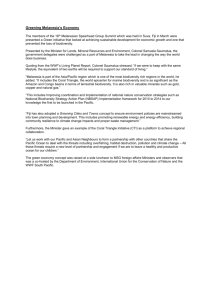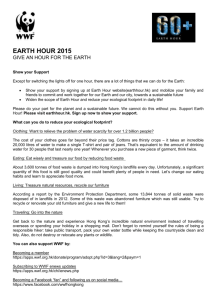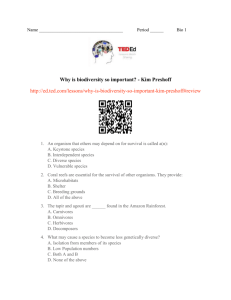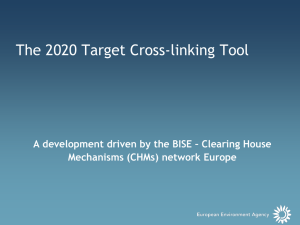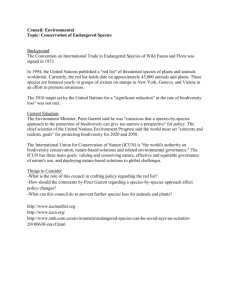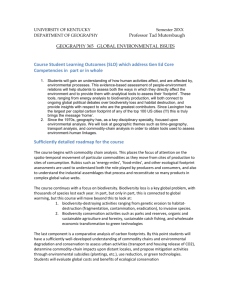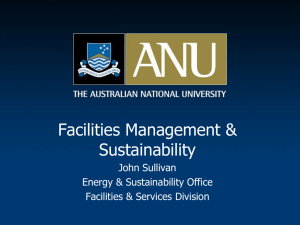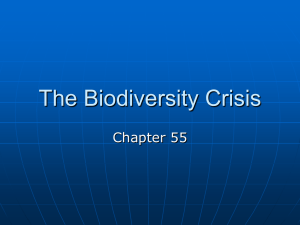CBD COP-12 Overview of WWF Positions 17 September 2014
advertisement
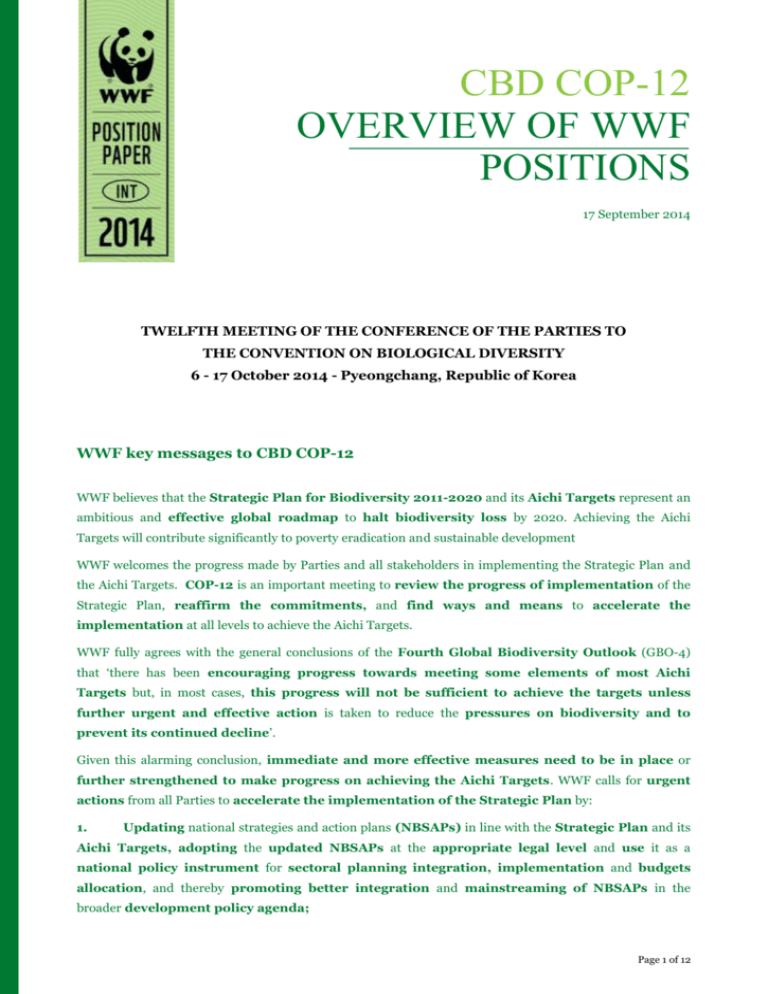
CBD COP-12 OVERVIEW OF WWF POSITIONS 17 September 2014 TWELFTH MEETING OF THE CONFERENCE OF THE PARTIES TO THE CONVENTION ON BIOLOGICAL DIVERSITY 6 - 17 October 2014 - Pyeongchang, Republic of Korea WWF key messages to CBD COP-12 WWF believes that the Strategic Plan for Biodiversity 2011-2020 and its Aichi Targets represent an ambitious and effective global roadmap to halt biodiversity loss by 2020. Achieving the Aichi Targets will contribute significantly to poverty eradication and sustainable development WWF welcomes the progress made by Parties and all stakeholders in implementing the Strategic Plan and the Aichi Targets. COP-12 is an important meeting to review the progress of implementation of the Strategic Plan, reaffirm the commitments, and find ways and means to accelerate the implementation at all levels to achieve the Aichi Targets. WWF fully agrees with the general conclusions of the Fourth Global Biodiversity Outlook (GBO-4) that ‘there has been encouraging progress towards meeting some elements of most Aichi Targets but, in most cases, this progress will not be sufficient to achieve the targets unless further urgent and effective action is taken to reduce the pressures on biodiversity and to prevent its continued decline’. Given this alarming conclusion, immediate and more effective measures need to be in place or further strengthened to make progress on achieving the Aichi Targets. WWF calls for urgent actions from all Parties to accelerate the implementation of the Strategic Plan by: 1. Updating national strategies and action plans (NBSAPs) in line with the Strategic Plan and its Aichi Targets, adopting the updated NBSAPs at the appropriate legal level and use it as a national policy instrument for sectoral planning integration, implementation and budgets allocation, and thereby promoting better integration and mainstreaming of NBSAPs in the broader development policy agenda; Page 1 of 12 2. Fully implementing COP 11 decision on Resource Mobilization (Dec XI/4) without further delay, and urgently increase investments from all sources towards biodiversity conservation and ecosystem services to avoid further loss and as a way to secure livelihoods, reduce poverty and foster sustainable development; 3. Engaging fully in the UN negotiations for the post 2015 Development Agenda to ensure that the critical values of biodiversity and ecosystems are integrated into all relevant goals and targets, and that the post 2015 Development Agenda is a transformative agenda for the future of people and the planet. 4. Expand the protection of areas of particular importance for biodiversity and ecosystem services, through effectively and equitably managed, ecologically representative and well connected systems of terrestrial and inland water protected areas, and coastal and marine protected areas, including particularly in coastal systems with high dependency of local livelihoods and importance for food security; 5. Prioritizing halting habitat loss, in particular deforestation, and at the same time promoting ecosystem restoration; 6. Endorsing the results from the various regional workshops on the description of areas meeting the criteria for Ecologically or Biologically Significant Marine Areas (EBSAs) and ensuring that these areas are being afforded appropriate conservation and management measures. WWF is working actively with Parties, other Governments and stakeholders to intensify implementation of the CBD Strategic Plan 2011 - 2020 through global, regional, national and local initiatives to provide sustainable solutions for the planet. WWF urges COP-12 and the High Level Segment to send key messages to the United Nations General Assembly (UNGA) on the importance of meeting the Aichi targets which will lay the foundation for the successful implementation of the upcoming SDGs. OVERVIEW This paper provides an overview of WWF’s main positions, including joint positions with other NGOs, on key agenda items to be considered by COP-12: (11 &12) Fourth edition of the Global Biodiversity Outlook; (13) NBSAPs; (14) Resource mobilization; (16) Biodiversity and sustainable development; (19) Article 8(j) and related provisions; (21) Marine and coastal biodiversity; (25) Biodiversity and climate change; and (26) Ecosystem conservation and restoration; and Nagoya Protocol More detailed WWF position papers with proposed text changes are also available on panda.org/cop12 Page 2 of 12 Agenda Item 11. Fourth edition of the Global Biodiversity Outlook Item 12. Mid-term review of progress towards the goals of the Strategic Plan for Biodiversity 2011-2020, and the Aichi Biodiversity Targets, and further actions to enhance progress. WWF welcomes the Fourth Edition of the Global Biodiversity Outlook (GBO-4) and congratulates the CBD Secretariat and the authors of GBO-4 for their work. WWF fully agrees with GBO-4’s general conclusions listed in paragraph 4/Item 12, COP-12 Draft Decision in Document UNEP/CBD/COP/12/1/Add.2. WWF is concerned that four years after the adoption of the Strategic Plan for Biodiversity 2011-2020 and its Aichi Targets, progress towards the achievement of those targets is slow, and that without major political, societal changes and actions, these targets are not likely to be met by 2020. Moreover, WWF is deeply concerned that target 10 will not be met by its upcoming 2015 deadline. This is of significant concern, given the known climate change and ocean acidification effects on marine ecosystems, as demonstrated by the IPCC AR 5, as well as by the excellent CBD Updated Synthesis of the Impacts of Ocean Acidification on Marine Biodiversity. These effects will have serious consequences for livelihoods and food security globally if urgent measures to reduce anthropogenic impacts on vulnerable ecosystems are further delayed. The GBO4 draft executive summary notes that the Aichi Targets cannot be achieved in isolation, and this is also true of the management of our use of the oceans and coasts; we need an integrated ecosystem based approach that looks at the marine environment as a whole and that ensures that no one activity impedes upon another including making space for the ‘activity’ of biodiversity conservation, upon which so many other activities and economic and social outcomes depend. CBD, its Parties and all stakeholders cannot afford to fail again. WWF calls on Parties, other Governments, stakeholders and relevant organisations to take GBO-4’s conclusions seriously and translate them into real actions. WWF urges COP-12 to adopt the draft decision with consideration of WWF proposed text changes (as presented in Annex 1, below). In particular, WWF calls on COP-12 to urge Parties to: 1. Take urgent and specific priority actions that will accelerate demonstrable progress towards effective implementation of the Strategic Plan 2011-2020 to attain the Aichi Targets as recommended by the GBO-4. 2. Request the Executive Secretary to communicate and advance the key findings to international organisations, UN agencies, other Governments and stakeholders to support Parties in their efforts to garner commitments and mobilise additional resources according to the Resource Mobilization Strategy and Aichi Target 20 for the full implementation of the Strategic Plan 2011-2020 in order to attain the Aichi Targets, especially through the implementation of the national strategies and action plans (NBSAPs). Page 3 of 12 3. Engage and partner with civil society organisations, private sector, indigenous peoples and local communities in speeding-up implementation of the Strategic Plan and in particular NBSAPs at national levels. 4. Report to the Convention on progress using evidence-based information on biodiversity change, and use the capacity of partners such as CSOs, private sectors, indigenous peoples and local communities to help in monitoring and evaluating conservation work against relevant indicators, harmonizing indicators and data collection methods where possible to improve cost effectiveness. For more details see full WWF position paper with text change proposals to the COP-12 draft decision at: www.panda.org/cop12 Agenda Item 13. Review of progress in providing support in implementing the objectives of the Convention and the Strategic Plan for Biodiversity 2011-2020, and enhancement of capacity-building, technical and scientific cooperation and other initiatives to assist implementation. WWF welcomes the draft decision on agenda item 13 in Document UNEP/CBD/COP/12/1/Add.2 and urges COP-12 to consider WWF key recommendations in its final decision. The building block for national implementation of the CBD Strategic Plan 2011-2020 is the National Biodiversity Strategy and Action Plan (NBSAP). Parties should, by 2015, have updated their NBSAP and made clear progress on implementation against measurable national targets, reflecting the global Aichi Targets, using indicators. Indicators should clearly allow for monitoring and review of the implementation framework. NBSAPs should have funding and resource mobilisation strategies. NBSAPs should be adopted at the appropriate legal level and well positioned in national policy with clear pathways for mainstreaming and integration into broader national development strategies and budgets at different levels. However, WWF draws attention to the fact that only 12 more updated NBSAPs have been submitted since May 2012, and that the total, as of July 2014, remains at 26. Many reports continue to lack evidence-based information on biodiversity change that is essential for monitoring delivery of Aichi targets. Even with an expected increase by the time of COP 12 in October, WWF is concerned that, despite positive commitments, the pace of revisions is too slow to achieve any significant level of implementation. At the current rate, there will be little time to consolidate measure and mobilise resources for concerted implementation. Business as usual will not achieve any of the Aichi Targets. COP-12 should call for actions from all Parties, other Governments and stakeholders to accelerate the implementation of the Strategic Plan by providing and mobilising the required technical assistance, technology transfer, financial resources and capacity building to ensure effective development, implementation and monitoring of NBSAPs, especially in developing countries. WWF calls on COP-12 to urge Parties to: Page 4 of 12 1. Adopt and approve the updated NBSAPs at the appropriate legal level and use as a national policy instrument for sectoral planning integration, implementation and budgets allocation, and thereby promote better integration and mainstreaming of NBSAPs in the broader development policy agenda; 2. Develop funding and resource mobilisation strategies in their NBSAPs for effective implementation and for the monitoring of relevant indicators; 3. Monitor, review and report on the implementation of NBSAPs using indicators 4. Efficiently use the available funding, in particular from GEF-6 and bilateral financial sources for developing countries, to accelerate the implementation of revised NBSAPs; 5. Share and provide proven solutions through technical assistance and funding support to, and between, developing countries, for the implementation of their updated NBSAPs; 6. Build regional collaborations to implement NBSAPs to create synergies among countries - these partnerships are essential for scaling up the implementation of NBSAPs and the Strategic Plan for Biodiversity 2011-2020 at regional level and for harmonizing monitoring systems for more cost effective collection and sharing of data. 7. Involve all stakeholders, inter alia, civil society, private sector and indigenous peoples and local communities in the NBSAP revision, updating, implementation and monitoring; 8. Improve the monitoring of Aichi targets by investing in data collection and analysis, harmonizing systems and indicators to allow more cost effective data collection and sharing, and using data for informed decision-making, policy development and adaptive management to improve NBSAP delivery. WWF strongly calls on CBD to provide guidance and standards for NBSAPs, ensuring NBSAPs are closely aligned to the Strategic Plan and its Aichi Targets, compatible and are of high quality. WWF calls on GEF Implementing Agencies, when supporting Parties to develop and update their NBSAPs, to ensure that relevant quality standards are met, and national targets directly contribute to the Aichi Targets implementation For more details see full WWF position paper with text change proposals to the COP-12 draft decision at: www.panda.org/cop12 Agenda Item 14. Resource Mobilization The group of NGOs consisting of Conservation International (CI), BirdLife International, The Nature Conservancy (TNC), and WWF commend the ongoing process to review and improve the implementation of the Strategy for Resource Mobilization (SRM) in order for Parties to achieve the Strategic Plan for Biodiversity (2011-2020). We welcome the commitments made by Parties at COP 11 and the efforts to scale up resources that have followed. However, the current level of financial investments – two years after Hyderabad – is still insufficient to achieve the Aichi Targets. Page 5 of 12 The NGOs call on 1. developed country Parties to accelerate efforts to mobilize funding to meet the 2015 target on international financial flows as a minimum step (Decision XI/4, para 7a, and make their expenditure transparent in order to track progress towards achieving the 2015 target of doubling international financial flows, foresee providing resources above the 2015 target level when requested by developing countries that have met all of the commitments under decision XI/4 and that have identified specific priority activities for biodiversity conservation. 2. Parties to prioritize biodiversity in their national programs and plans according to Decision XI/4 para 7b, urgently mobilize additional resources through various biodiversity financing mechanisms (BFM) and adopt the guidelines for BFM safeguards, and by 2016, to meet at least 50% of their resource needs, and have a clear plan in place for meeting the remaining 50% of their resource needs by 2020. 3. Parties to accelerate their monitoring and reporting on domestic biodiversity spending, gaps and needs by 31 December 2015, using the revised reporting systems, and have all necessary assessments and resource mobilization strategies in place by 2016. 4. Developed and developing country Parties to collaborate to increase country capacity to absorb financial resources for efficient implementation of the Strategic Plan; to establish appropriate governance structures to efficiently allocate and spend the provided funding, to ensure transparency and accountability of all financial flows for biodiversity from all sources, to initiate at COP 12 the scaling up of targeted technical support and capacity-building for appropriate resource mobilization and management, to be funded by developed country Parties in response to specific needs articulated by developing countries, 5. Parties to speed-up implementation of Aichi Target 2 on incorporating biodiversity values into national accounting and in all planning and policy processes at all levels of government, including plans for development and poverty reduction, to make significant progress on Aichi Target 3 and adopt the milestones, contained in Annex I to the draft decision (UNEP/CBD/COP/12/1/Add.2), as a roadmap for the full implementation of this target, and to enhance progress on Aichi Target 4 by developing positive incentives, regulations and guidelines to encourage business engagement in sustainable production, and sector specific actions, in particular for fish and seafood to deliver on Target 6, and on agriculture, aquaculture and forestry to deliver on Target 7. For more details see full position paper at: www.panda.org/cop12 Agenda Item 16. Biodiversity and Sustainable Development The UN post 2015 process is a once in a generation opportunity to ensure that the value of biodiversity and ecosystem services is fully recognised and integrated into the future global sustainable development agenda Page 6 of 12 WWF urges COP-12 to adopt the draft decision on this agenda item from Document UNEP/CBD/COP/12/1/Add.2 with WWF proposed text changes set out below, and particularly to call on Parties to: 1. Engage fully in the UN negotiations for post 2015 to ensure that the critical values of biodiversity and ecosystems are integrated into all relevant goals and targets, and that the post 2015 is a transformative agenda for the future of people and the planet; 2. Welcome the integration of biodiversity and ecosystem aspects into the proposed SDGs by the Open Working Group on SDGs; 3. Integrate biodiversity and ecosystem services into national poverty eradication strategies and national development, accounting and planning processes; 4. Note the necessity to meet the Aichi targets and welcome the challenge to build further on them if the proposed SDGs are to be achieved; and 5. Reflect these messages in the High Level Segment’s Statement and the ‘Pyongchang Roadmap to 2020’. For more details see full WWF position paper with text change proposals to the COP-12 draft decision at: www.panda.org/cop12 Biodiversity and Human Health Regarding biodiversity and human health, WWF and TRAFFIC welcome the state of knowledge review on Biodiversity and human health, prepared by the CBD and WHO, and the development of recognition for linkages between biodiversity and human health, especially as relevant to the sustainable use and conservation of plants and animals that form the raw materials both of traditional and modern medicines. A practical example of such links is the work of WHO, WWF, TRAFFIC, and IUCN on the update and finalization of the WHO/IUCN/WWF/TRAFFIC guidelines on the conservation of medicinal plants. WHO recognizes the role of medicinal plants in delivering primary healthcare around the world, and WWF, TRAFFIC and IUCN would like to ensure that where the plants are used it is sustainable, emphasizing the biodiversity importance of these species survival, as well as their importance for sustainable livelihoods. Accordingly, we would like to see CBD Parties, Secretariat and stakeholders acknowledge and champion this work. For more details see full WWF position paper with text change proposals to the COP-12 draft decision at: www.panda.org/cop12 Agenda Item 19. Article 8(j) and related provisions Traditional knowledge, innovations, and practices of indigenous peoples, and local communities are an essential component of good governance of natural resources, and are key to maintaining sustainable conservation landscapes, developing better land and resource use plans, and supporting livelihood systems especially for those people who directly manage and greatly depend on natural resources for a living. Page 7 of 12 WWF believes that the protection and integration of traditional knowledge in conservation and sustainable use of biodiversity can help make an important and tangible contribution to the wellbeing and livelihood security of those indigenous peoples and local communities living in and around conservation areas, and contribute to sustainable and equitable development of the countries. WWF calls on Parties and all stakeholders to: 1. Effectively and meaningfully involve indigenous peoples and local communities to participate in the collection of data, support community-based monitoring, and further encourage community-based monitoring and information systems contribution to mid-term review of the Strategic Plan for Biodiversity 2011‑2020 and its Aichi Biodiversity Targets and in particular Aichi Target 18. 2. Provide support for the development of bio-cultural community protocols in the context of the implementation of the Nagoya Protocol on ABS to respect and recognize intellectual property rights on traditional knowledge appropriate to the shared and collective nature of these rights in traditional and indigenous communities 3. Endorse the Plan of Action on customary sustainable use, as a new major component of the revised programme of work for Article 8(j) that aims to integrate the article 10c and related provisions and ensure that customary sustainable use is effectively recognized in national land use planning and contribute to sustainable land use planning at large scale and adopted in the proposed SDGs 4. Encourage representation and participation of indigenous peoples and local communities in the decision-making for all initiatives and programs related to the use, exploitation and protection of biodiversity in their traditional lands and on which they depend on for their livelihoods 5. Seek and secure FPIC of the indigenous peoples and local communities for any projects or initiatives to be conducted in their areas/territories, particularly those related to access to traditional knowledge associated to genetic resources. 6. Ensure that appropriate capacity building and educational opportunities and resources be allocated to strengthen innovation and resilience of indigenous peoples and local communities in the face of climate change as well as to promote sustainable development. 7. Continue with the development of national and local sui generis for the conservation and protection of traditional knowledge with full and effective participation of indigenous peoples and local communities. 8. Ensure that adequate resources and mechanisms are in place to support the effective participation of indigenous peoples and local communities in the work of the Convention and their participation in national implementation. For more details see full WWF position paper to the COP-12 draft decision at: www.panda.org/cop12 Page 8 of 12 Agenda Item 21: Marine and Coastal Biodiversity WWF calls upon COP-12 to adopt the draft decision contained in document UNEP/CBD/COP/12/1/Add.2 with respect to marine and coastal biodiversity taking into consideration the changes suggested by WWF on ecologically or biologically significant marine areas/EBSAs. In particular, WWF urges Parties to: 1. Endorse the results from the various regional workshops on the description of areas meeting the EBSA criteria reflecting the best available scientific information and to welcome the corresponding workshop reports in their entirety. 2. Ensure that the process of describing areas meeting the EBSA criteria will be continued to encompass the remaining regions where workshops have not yet been held with a view to cover all oceans and seas. 3. Agree on future work towards compiling scientific and technical information on the types and levels of human uses in areas described as meeting the EBSA criteria and in adjacent or associated areas that could potentially impact these areas or their biological components. 4. Seek ways and means to cooperate, including through competent organizations, to identify and adopt, according to their competence, appropriate measures for the conservation and sustainable use of marine biodiversity in areas that meet the EBSA criteria. 5. Adopt the recommendations on addressing impacts on marine and coastal biodiversity of anthropogenic underwater noise as proposed by SBSTTA-18, and further to immediately implement appropriate measures to factually reduce the level of underwater noise in the marine environment. 6. Adopt the recommendations referring to ocean acidification, priority actions to achieve Aichi Biodiversity Target 10 for coral reefs and closely associated ecosystem, and marine spatial planning and training initiatives as proposed by SBSTTA-18. For more details see full WWF position paper with text change proposals to the COP-12 draft decision at: www.panda.org/cop12 Agenda Item 25. Biodiversity and Climate Change WWF welcomes the draft decision as set out in UNEP/CBD/COP/12/1/Add.2. In particular, WWF calls on COP-12 to adopt the following recommendations in its final decision on this issue. 1. The IPCC report (AR5 2014) states that “most assessments of adaptation have been restricted to impacts, vulnerability, and adaptation planning, with very few assessing the processes of implementation or the effects of adaptation actions.” In order to promote best practices and lessons learned on ecosystem-based adaptation, WWF calls on COP-12 to request the Executive Secretary to compile documentation and information of biodiversityrelated climate adaptation strategies that have been successfully implemented, and share this information among Parties to the CBD and UNFCCC (see Para 3 of the draft decision). Page 9 of 12 2. In order to maximize biodiversity related benefits of REDD+ activities WWF calls on COP 12 to request the Executive Secretary to compile an assessment how the guidance on non-carbon benefits and REDD+ monitoring, reporting and verification (MRV) can best contribute to the objectives of the CBD (see Para 7 of the draft decision). 3. WWF also calls on COP-12 to request the Joint Liaison Group of the CBD, UNFCCC and UNCCD to develop guidance on the prevention of maladaptation that has adverse consequences on biodiversity conservation (see Para 8 amended in the draft decision). 4. Finally, WWF calls on removing brackets from paragraphs in the draft decision in order to strengthen the link between climate change mitigation and adaptation, and biodiversity conservation. For more details see full WWF position paper with text change proposals to the COP-12 draft decision at: www.panda.org/cop12 Agenda Item 26. Ecosystem Conservation and Restoration WWF welcomes the initiative of the Republic of Korea on forest and ecosystem restoration to support Parties to the Convention on Biological Diversity to achieve Aichi Targets 5, 11 and 15 in an integrated manner. The global protected areas network is the most effective tool for delivering biodiversity conservation, ecosystem services, providing both protection of critical sites and an existing management structure and capacity to ensure ecosystem services are efficiently delivered. WWF therefore welcomes the progress towards the achievement of Aichi Target 11 globally to increase protected area coverage of terrestrial and inlands waters, as well as the continuing expansion of marine protected areas. However, much work remains to be done, especially on improving the management, enforcement and financing of protected areas. WWF believes conservation of ecosystems can be best achieved through protected areas and should also be integrated with other spatial and management measures such as land-use and marine spatial planning, and national resource use policies. WWF calls on COP-12 to urge Parties to: 1. Expand the protection of areas of particular importance for biodiversity and ecosystem services, through effectively and equitably managed, ecologically representative and well connected systems of terrestrial and inland water protected areas, and coastal and marine protected areas, including particularly in coastal systems with high dependency of local livelihoods and importance for food security; 2. Ensure that areas that meet the criteria for Ecologically or Biologically Significant Marine Areas (EBSAs) are being afforded appropriate conservation and management measures; Page 10 of 12 3. Engage all relevant stakeholders in the process of designing, establishing and managing protected areas including indigenous peoples and local communities, the private sector and civil society; 4. Ensure existing protected areas are well managed and systematically assessed against achieving their targets. 5. Ensure sufficient financing for protected area systems and develop sustainable financing plans. 6. Develop climate adaptation plans and implement adaptation measures to build resilience of protected areas and support vulnerable indigenous peoples and local communities. 7. Integrate protected areas networks into broader management frameworks including comprehensive land-use and marine spatial planning; 8. Recognise that protection and restoration of ecosystems needs to be part of national development programmes to regain ecosystem services and as an economically viable source of income for indigenous peoples and local communities; 9. Promote the understanding of the values of ecosystem goods and services, including the intrinsic values of biodiversity, and incorporate these values in policy planning and management decisions in line with the Aichi Target 2; 10. Develop mechanisms that involve and encourage indigenous peoples and local communities to reduce degradation and promote conservation and restoration of ecosystems 11. Build a robust and publicly available system to monitor degradation of ecosystems and guide future policies and actions; 12. Promote public policies at national and subnational levels for land use planning and management, that promotes ecosystem conservation and restoration and/or to avoid ecosystem degradation, through financial incentives and other means according to Aichi targets. 13. Identify and promote large-scale transnational restoration activities, and restore natural corridors to establish or re-establish connectivity for critical species and key habitats; 14. Promote both species and genetic diversity while avoiding the introduction and spread of non-native, exotic and invasive species; and 15. Promote a better linkage in ecological representativeness and good connectivity of “areas of particular importance for biodiversity and ecosystem services” with UNESCO World Heritage Sites, Ramsar Sites and Biosphere Reserves, promoting the creation and development of transboundary protected areas and biological corridors. For more details see full WWF position paper with text change proposals to the COP-12 draft decision at: www.panda.org/cop12 Page 11 of 12 Nagoya Protocol WWF congratulates the Convention and its Parties of the entry into force of the Nagoya Protocol. WWF believes that this is a major milestone in global efforts to promote better implementation of the Convention. Regulated access to genetic resources and the fair and equitable sharing of the benefits arising from their utilisation is an important way to value biodiversity conservation and to ensure all stakeholders including private operators and local peoples can effectively contribute to sustainable development and conservation of the natural resources that we are all dependent upon. Further support will be important to raise awareness on the new regulatory system, establish the Clearing House and build up capacity particularly in provider countries to support the effective implementation of the Nagoya Protocol. Making the Nagoya Protocol operational and consistent with national legislation will enable the Convention and its Parties to meet the Aichi Target 16, which is a positive signal to accelerate the implementation of the Strategic Plan for Biodiversity 2011-2020 and its Aichi Targets. All WWF position papers with text change proposals to the COP-12 draft decisions are available at: www.panda.org/cop12 For further information contact: Susan Brown Director, Global and Regional Policy WWF International E-mail: sbrown@wwfint.org Dao Nguyen Coordinator, Biodiversity Policy WWF International Email: dnguyen@wwfint.org © 1986 Panda symbol WWF – World Wide Fund for Nature (Formerly World Wildlife Fund) ® “WWF” is a WWF Registered Trademark. WWF, Avenue du Mont-Bland, 1196 Gland, Switzerland – Tel. +41 22 364 9111 Fax +41 22 364 0332. For contact details and further information, please visit our international website at www.panda.org Page 12 of 12
